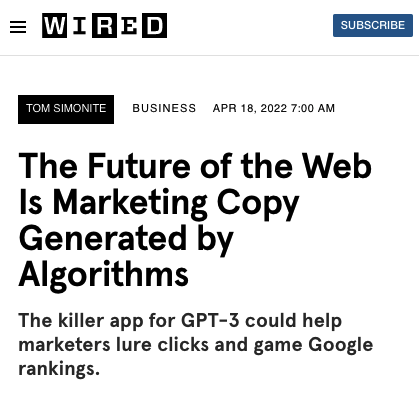For personal sites, its probably a losing battle.
Writing on the ibternet feels like a weird exercise. I write a para or 2 and immediately go over it wuth a fine toothcomb, wondering if the words are 'relevant' for search engines. I work partially in an SEO role professionally so that instinct does kick in. It's a good instinct to have, but over time it leads to a style of writing that optimizes for the lowest common denominator.
I often have to remind myself that Im writinfg for myself. And the writinf is not so self indulgent that no one can find value from it. • You can tell when a popular website gets its traffic via social media. It's information architecture is dreadful, every post is either dumped into an infinitely scrolling homepage, or the taxonomy is ugly and clumsy in its machine-generated, search-engine optimized tags.
Like any normal person writing online, I would like for my stuff to be read. The readership doesn't have to be in the millions, or even in the hundreds of thousands. After all, I have a self-published print magazine from which I've gotten a lot out of, despite the worldwide readership coming in at under 5 figures (if I count the decimal points).
But the hardest thing to do for a brand new web site is to actually show up on search engines at all. Chances are, any topic you write about has likely been covered, even tangentially, by a larger, older, more established website. Search engines consider at a dizzying array of factors in deciding how high to rank a particular page, but some appear to be set in stone.
The first of those is backlinks, i.e., the number of times other websites have linked to pages on your site. Ordinarily, this would mean that each link from your site that's been shared on Facebook and Twitter should be boosting your signal on search engines. This is of course not the case; that would be far too simple! Most search engines today downgrade the importance of links posted on social media, because of the prevalence of linkspam that already pollutes those sites. Nope, the 'backlinks' that matter here are those that are posted on actual 'web-sites' from the Web 1.0 era, like message boards and personal blogs. Of course corporate websites are included here as well, but let's face it, there's no reason for them to link to some random blog. And as we all know, one of the best parts of the Web 1.0 era was the blessed absence of corporate sites to begin with.
The second seemingly evergreen factor is particularly stupid:length. Google search execs will swear up and down that length is irrelevant, yet can't explain why every cooking recipe that reaches the first page of results seems to include a small novella about the chef's grandmother before getting to the 1 paragraph of relevant information. The only time you'll ever see content that isn't monstrously verbose is for low-information searches like 'celebrity net worth'. And in those cases, Google won't even deign to link the website up top on the results page. It will scrape the information and put it on the page itself, saving you a click. This is what's known as a "zero-click search"
All this implies that a better search engine is possible if X or Y optimization was chosen instead of W or Z. But it won't be. Google sells ads first and foremost; the quality of search only needs to be good enough so that people don't go elsewhere. And for years, that's proved to be the case. Despite there being a 1996-style renaissance in new search engines (Ecosia, Duck.com, Brave Search, Startpage.com), Google remains un-toppled, its effigy unscathed.
But, it's possible that cracks are finally, finally beginning to show. It hasn't escaped anyone's notice that the results page has been serving more and more ads before showing organic results. While that's certainly led to an increase in the annoyance quotient, it hasn't bled into hurting the quality of organic results...until now. Google has been gamed, and there's no turning back. Most useful information isn't delivered by a standard search anymore. You must append "site:reddit.com" to limit results to those from some sane domain. This is because B2B businesses and affiliate link sites have monopolized search results to show some variation of this for any possible search:
[[best nutrition plan for beginners 2022]]
And that's not even considering the impact that AI will have in this sector. I'm pretty skeptical of its higher-flying promises such as self-driving cars, but I have no doubt that AI will wipe the floor with the lowest-hanging fruit, which is writing marketing copy for websites. The writing is already systematized to work in favour of search engines rather than people. Will we even be able to tell the difference between worked churned out by a content mill manned with Fiverr.com writers creating their 5th article of the day? The standard has been lowered enormously to fill the demand for 'content'
For the most part, users seem to have gone along with it. But, we now appear to have reached a point where the organic search results themselves are so obviously gamed, the average person is actually considering alternatives. Granted, the alternative has been TikTok, an even stupider medium for locating information, but considering the enormous downgrading of internet IQ that walled-gardens and walled-phones have bestowed, we can't expect good decision-making from netizens at this juncture.
- Robin rendle anti seo
- Glider mag anti seo
Millionshort.com and wiby.me exist as examples of search engines that try to give you a fighting chance against the deluge of blogspam.
Examples of bad sites
- Celeb net worth
- product review sites filled eith aff links (sitebuilderreport)
- albumoftheyear.org
